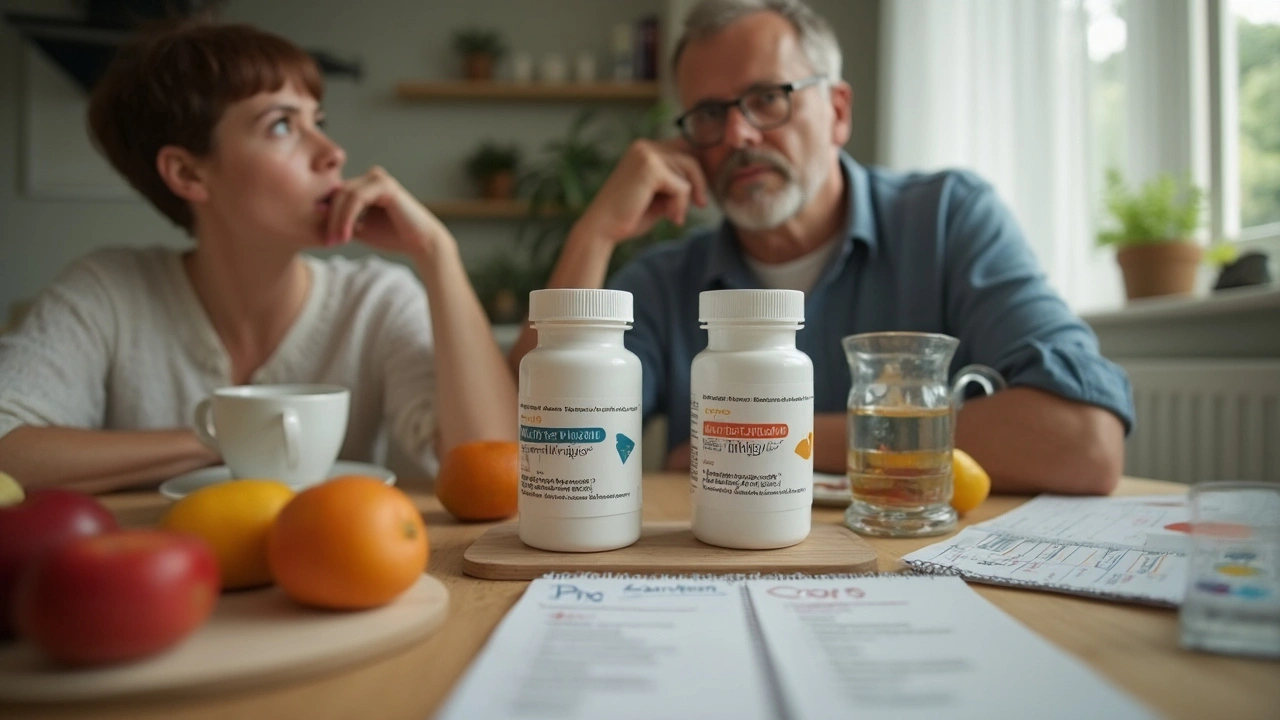Think about it: Metformin is basically the rock star of type 2 diabetes drugs. Everyone gets it. But there’s always someone in the crowd who can’t handle loud music (or in this case, metformin’s side effects). That’s where alternatives like acarbose and miglitol stroll in—alpha-glucosidase inhibitors with a much less flashy reputation. But do they get the job done, or are they just opening acts you skip?
How Alpha-Glucosidase Inhibitors Work (And What Makes Acarbose and Miglitol Different)
First, let’s talk action. Alpha-glucosidase inhibitors—acarbose and miglitol are the go-tos—don’t mess with insulin release or sensitivity. Instead, they slow down digestion of complex carbs right in the small intestine. Here’s the fun part: when you eat a bowl of pasta, the carbs get broken down slowly rather than dumped into your bloodstream all at once. So you avoid those wild blood sugar spikes after meals.
Acarbose comes from bacteria found in soil (Actinoplanes utahensis, for those who want pub quiz ammo), while miglitol is synthesized in a lab. Despite their similarities, there are key differences. Miglitol dissolves very well in water and is absorbed into the bloodstream, then gets filtered out by the kidneys. Acarbose, in contrast, mostly stays in the gut doing its thing right there—not much of it ever gets absorbed. Both drugs are taken right before meals, so timing is everything.
Now, the numbers. Acarbose has been shown to reduce HbA1c by about 0.7% on average. Miglitol is in the same range, sometimes a touch lower in real-world data. That’s not as dramatic as metformin (which can get you to about 1.5%), but it’s not nothing. The real standout moment for these drugs is their ability to blunt post-meal blood sugar surges. If you tend to spike right after eating, this is exactly what you want.
But don’t get too excited just yet. The catch? You have to be disciplined with your eating. No skipping doses, no snacking without the pill, and definitely no big sugar binges if you want them to work well. They don’t do much for fasting glucose—so if your overnight blood sugar is the big problem, you’ll need more than just these.
And honestly, not every doc thinks of prescribing them first. Metformin tends to be cheaper, backed by larger studies, and isn’t surrounded by quite as many, uh...toilet stories (more on that soon).

Efficacy: Do Alpha-Glucosidase Inhibitors Hold Their Own Next to Metformin?
Metformin has a rep for being hard to beat. It not only manages blood sugar, but also might protect your heart and help with weight. So, what’s the contest here? Alpha-glucosidase inhibitors aren’t designed to take on everything at once—but they have a couple of unique tricks up their sleeves. For people with prediabetes, some research—like the huge STOP-NIDDM trial—found that acarbose actually lowered the development of diabetes by about 25%. In smaller studies, miglitol had similar abilities, taming those nasty post-meal spikes that lead to wear-and-tear on your pancreas.
Where they really shine is for folks who eat carb-heavy diets. If you love rice, bread, noodles, or potatoes, these drugs slow the breakdown, meaning you get lower glucose peaks. Some Asian clinics, faced with diets heavy on starchy foods, use these meds more often. Yet, outside certain regions—say, Germany or parts of China—they don’t get much love in the prescription pads. Why? Some of it’s about familiarity, and some is about side effects (yup, we’re heading to the bathroom again soon).
Weight is a huge deal for type 2 diabetes. Good news: acarbose and miglitol are basically weight-neutral and, in some trials, people shed a little thanks to eating less overall. They don’t cause lows (hypoglycemia) unless you’re on insulin or a sulfonylurea, so you won’t suddenly get shaky or sweaty if you miss a meal. This is a big deal for anyone who’s had a scary blood sugar dip before. Also, they play nice if you have kidney issues (except maybe for miglitol, which hangs out in the blood and should be dialed down with poor kidney function).
One often overlooked perk is heart protection. One trial out of Germany found long-term acarbose might help reduce risk for tiny blood vessel problems, like what causes some eye or nerve damage. Again, metformin probably still wins for heart disease. But if you can't tolerate metformin—or want something extra for those meal spikes—these inhibitors are worth considering.
There’s also the trick of combining. Some folks do well on a lower metformin dose plus an alpha-glucosidase inhibitor. Think of it as tag-teaming your diabetes management. And, if you feel your current setup isn’t cutting it, you can check out this helpful guide on Metformin substitute options for more ideas to discuss with your doctor.

GI Side Effects: Tolerability and Real-World Tips for Surviving Acarbose & Miglitol
If you’ve heard anything at all about alpha-glucosidase inhibitors, it’s probably the stomach drama. I’m not going to lie: they can cause serious gas, bloating, and sudden sprints to the nearest restroom. The science says about 70% of people on acarbose feel gassy, at least at first. Miglitol can be a little gentler, but any medicine that slows carb breakdown in your gut means gut bacteria get more food—and make more gas. We’re talking epic, sometimes embarrassing “clear-the-room” farts. But hey, no dangerous lactic acidosis like metformin can bring, so you pick your battles.
But here’s what real-life users figure out: start low and go slow. Doctors often recommend starting at 25 mg once daily, then sneaking up to higher doses over several weeks. This gives your gut bacteria time to adjust so you’re not blowing up like a hot air balloon after every meal. And those carbs you can’t resist? Try to keep sugar and refined carbs in check—complex carbs are easier for your stomach to handle. Folks who ignored this found themselves stuck with cramps and loose stools more than they’d like.
Another trick: if you miss a dose, there’s no need to “make up for it.” Taking extra with one meal doesn’t help and just means more GI chaos. Also, don’t take these if you’re fasting or eating a low-carb meal—there’s nothing to block, so you’re just asking for trouble. And if you start seeing undigested foods in your stool, that’s your body’s way of saying, “ease up on the dose.”
No question, some people just can’t handle the gut side effects, especially older adults or those with existing stomach problems. If you have IBD, digestion isn’t your strong suit, or you already spend too much time in the bathroom, you’ll want to find another option. But if you’re willing to put up with a few weird noises and smells for better glucose control, these drugs are a fair trade for some people.
One last unexpected upside: because these meds work in your digestive tract instead of targeting insulin, there’s no risk of making your pancreas tired or making things worse in the long run. And unlike some other diabetes drugs, you don’t need to worry about weight gain, heart failure, or crazy expensive pharmacy bills—at least outside the United States, where generic acarbose is a bargain in most pharmacies.
Still, alpha-glucosidase inhibitors don’t work miracles. Their effect is real, proven by solid studies, but smaller than you might hope if your numbers are way out of control. For some people, they’re a perfect sidekick—either as a Metformin substitute or as a partner to whatever diabetes plan you already have. Bottom line: if your biggest struggle is those after-meal spikes and you can live with a bit of gas, these meds can absolutely hold their own—for the right person, with the right expectations.


Comments
Deb Kovach May 23, 2025 AT 17:45
If you're considering an alpha‑glucosidase inhibitor, the first thing to check is your meal pattern. These drugs only work when carbs are present in the gut, so timing matters. Acarbose and miglitol both need to be taken right before you sit down to eat. Starting at a low dose-usually 25 mg for acarbose-gives your intestinal flora a chance to adapt. The most common side effect is gas, but it usually peaks in the first two weeks and then wanes. To minimize the discomfort, try a gradual dose escalation every week. Pairing the medication with a low‑glycemic, fiber‑rich meal can also blunt the fermentation that causes bloating. If you have chronic constipation or IBS, discuss alternative options with your endocrinologist because the extra sugar in the colon can aggravate symptoms. In terms of efficacy, expect an HbA1c drop of about 0.5‑0.7 % when you’re adherent. That's modest compared with metformin, but it can be clinically meaningful when post‑prandial spikes are the primary problem. Some studies even suggest a reduction in the progression from pre‑diabetes to diabetes with acarbose, especially in Asian cohorts. The cardiovascular data are still emerging, but the reduction in post‑meal glycaemia may translate into lower microvascular risk over time. Remember to monitor kidney function if you’re on miglitol, as it is renally cleared. And don’t forget that these agents are weight‑neutral, which can be a plus if you’re already managing your BMI with diet and exercise. Bottom line: they’re a solid adjunct or alternative for people who can tolerate the GI effects and keep a consistent eating schedule 😊👍.
Sarah Pearce May 27, 2025 AT 11:45
so i read about acarbose and miglitol and omg the side effects sound like a horror movie!!! i mean who wants to spend their day in the bathroom??? the whole "just take it before meals" rule seems kinda silly if you end up running to the loo every 30 min!!! also the whole weight neutral thing is nice but honestly i could live without the constant gas and bloating...maybe i just stick to metformin.
Ajay Kumar May 31, 2025 AT 05:45
Hey, I get where you’re coming from. The GI stuff can be a real pain, but think of it like a training period for your gut. Start low, ramp up slowly, and many people find the gas settles down after a couple of weeks. It’s also worth noting that the post‑meal glucose control you get can be a lifesaver if you’re prone to spikes after big carb meals. Just keep an eye on your diet and stay consistent with the timing, and you’ll likely see the benefits outweigh the temporary discomfort.
Richa Ajrekar June 3, 2025 AT 23:45
While the author attempts to summarize the pharmacology, the prose unfortunately suffers from a lack of precision. The description of miglitol’s renal clearance, for instance, omits the necessary dosage adjustments for patients with reduced eGFR. Moreover, the casual tone undermines the seriousness of the gastrointestinal adverse events, which can be debilitating. It would be prudent to present these details with greater linguistic rigor to avoid misinterpretation.
Pramod Hingmang June 7, 2025 AT 17:45
Picture the gut as a bustling marketplace where enzymes are the merchants and carbs are the shoppers. Alpha‑glucosidase inhibitors act like friendly gatekeepers, letting only a fraction of the carbs pass through the door at a leisurely pace. This not only smooths out the blood‑sugar roller coaster but also gives your microbiome a chance to feast on the lingering starches, producing short‑chain fatty acids that can be beneficial. The trade‑off, of course, is a little extra chatter in the colon, but for many the payoff in glycaemic stability is worth the occasional rumble.
Benjamin Hamel June 11, 2025 AT 11:45
Actually, the gastrointestinal complaints are often blown out of proportion in lay discussions. While it's true that a sudden influx of undigested carbohydrates can fuel bacterial fermentation, the clinical trials consistently show that titrating the dose over a few weeks dramatically reduces the frequency and severity of flatulence. Moreover, comparing the modest HbA1c reduction to the massive body of evidence supporting metformin's cardiovascular benefits may be a mis‑aligned metric. If a patient cannot tolerate the initial discomfort, a slower escalation or concurrent use of an anti‑flatulent like simethicone can mitigate the issue without discarding a potentially valuable therapeutic option.
Christian James Wood June 15, 2025 AT 05:45
Let's be blunt: a 0.6‑percent drop in HbA1c hardly justifies the nightly sprint to the bathroom that some of these inhibitors provoke. Patients often report embarrassing episodes of sudden urgency, and that level of inconvenience can erode adherence faster than any modest glycemic gain. If you’re already on a stable metformin regimen, adding an alpha‑glucosidase inhibitor may feel like putting a band‑aid on a well‑healed wound. The real question is whether you’re willing to exchange a few extra minutes in the restroom for a marginal statistical improvement that, in many cases, doesn’t translate to meaningful clinical outcomes.
Rebecca Ebstein June 18, 2025 AT 23:45
Wow, this is super helpful! I love how you break down the dosing steps-makes it way less scary. I’ll definitely talk to my doctor about trying a low dose and see how my tummy handles it. Thanks for the tip about pairing with high‑fiber meals, that’s a game changer. 🌟
Artie Alex June 22, 2025 AT 17:45
Indeed, the pharmacokinetic profile of miglitol, being primarily renally excreted, necessitates careful dose modulation in subjects with compromised glomerular filtration. The mechanistic underpinnings of delayed carbohydrate absorption also modulate the enterohepatic circulation of bile acids, which can further influence gastrointestinal motility. It is imperative to weigh these physiologic cascades against the marginal HbA1c decrement when tailoring patient‑centred therapeutic regimens. A nuanced understanding of these pathways can avert suboptimal outcomes and optimize tolerability.
abigail loterina June 26, 2025 AT 11:45
Hey there! If you're thinking about trying acarbose or miglitol, remember it's all about consistency. Take the pill right before you eat, start with a low dose, and give your gut a week or two to adjust. Most folks find the gas problem eases up, and the steady post‑meal sugar levels are worth it. Feel free to ask any follow‑up questions, happy to help!
Roger Cole June 30, 2025 AT 05:45
Got it, thanks for the clear steps.
Krishna Garimella July 3, 2025 AT 23:45
Consider the broader perspective: medications are tools, not panaceas. The true mastery lies in aligning diet, activity, and pharmacology into a harmonious rhythm. When you respect the timing of a drug like miglitol, you acknowledge the subtle interplay between digestion and endocrine response, fostering a deeper consciousness of your own physiology.
nalina Rajkumar July 7, 2025 AT 17:45
Totally 🌟 love the holistic view! It reminds me to stay mindful of meal timing 😊
Michael Barrett July 11, 2025 AT 11:45
Indeed-literature across multiple meta‑analyses consistently cites a mean HbA1c reduction of ~0.6% for alpha‑glucosidase inhibitors; however, one must also consider the confidence intervals, the heterogeneity of study populations, and the concomitant use of other antihyperglycemic agents. Moreover, the cost‑effectiveness ratio, especially in regions where generic acarbose is inexpensive, further complicates the decision matrix; yet, the gastrointestinal adverse‑event profile remains a limiting factor that warrants diligent patient education and dose titration protocols.
Inma Sims July 15, 2025 AT 05:45
Oh, absolutely, because we all love a good 500‑word dissertation when a simple sentence would suffice. Congrats on mastering the art of stating the obvious in the most roundabout way possible.
Gavin Potenza July 18, 2025 AT 23:45
From a philosophical standpoint, the acceptance of a modest HbA1c improvement via a drug that induces colonic symphonies reflects a broader existential trade‑off: are we willing to endure short‑term discomfort for incremental long‑term health gains? Practically speaking, many patients find that the occasional flatulence is a small price to pay for smoother post‑meal glucose curves, especially when other agents aren't tolerated.
Virat Mishra July 22, 2025 AT 17:45
Well, if we’re going to romanticize bowel turbulence as a noble sacrifice, let’s also remember that not everyone enjoys a daily concerto of gas. Some of us prefer a quieter digestive experience, thank you very much.
Daisy Aguirre July 26, 2025 AT 11:45
Hey folks! 🌈 I totally get that the gas can be a buzzkill, but think of the bright side: you’re actually giving your gut bacteria a feast, which can boost those feel‑good short‑chain fatty acids. Plus, the post‑meal sugar control is like a safety net for your pancreas-so you’re doing yourself a favor on the long run. Keep shining, and remember consistency is key! 🌟💪
Natalie Kelly July 30, 2025 AT 05:45
Thanks, that was really helpful (sorry for the typo).
Tiffany Clarke August 2, 2025 AT 23:45
Gas is annoying.